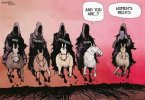Lately I've started considering Postmillenial eschatology. I'd never seriously thought about it before.
I thought postmil guys were liberal social gospel types.
I've never had concrete convictions about the end times, having generally leaned historic Premillennial, but thought the pre-trib rapture dispensational guys might be right.
Being Reformed leaning, I know a lot of Reformed guys are Amillennial, but I hadn't given that view much attention either.
Prior to the twentieth century the postmil view seems to have been the most widely held. WW1, WW2, the Holocaust, and Marxism put a bit of a damper on "hopeful eschatology".
For the last century, Dispensational premillennialism has been the most widely held view in the Evangelical world.
Recently I've been listening to podcasts by a bunch of postmill guys and find their arguments to make quite a bit of sense (and I like these guys in general). Some of the teachers I've been listening to include Jeff Durbin, Brian Sauve - The King's Hall, Doug Wilson, James White, Joel Webbon, AD Robles, etc.
Psalm 2 , Psalm 110, Matthew 28:18-20, Isaiah 42, and 1st Corinthians 15:10-28, would seem to support the Postmil view.
Maybe Christ defeats all His enemies by the Holy Spirit working through a gradually triumphing Church (rather than just showing up unexpectedly one day and instantly stomping all His enemies).
Most of the men who built the great cultures of the West seem to have been postmil (the Reformers, the Puritans, Jonathan Edwards, Spurgeon, etc).
Most of the weak Christians who have been largely losing for the last hundred years seem to be Dispensational Premil.
The first group built great institutions and cultures. The later group seems to be largely losing them all, biding their time and either waiting to escape via rapture (pretrib premil) or getting ready to endure the tribulatuon (hiding out in the sticks).
Gross oversimplification, I know
I'm probably annoying everyone.
I like to consider things, and this is something I'm trying to work through.
I thought postmil guys were liberal social gospel types.
I've never had concrete convictions about the end times, having generally leaned historic Premillennial, but thought the pre-trib rapture dispensational guys might be right.
Being Reformed leaning, I know a lot of Reformed guys are Amillennial, but I hadn't given that view much attention either.
Prior to the twentieth century the postmil view seems to have been the most widely held. WW1, WW2, the Holocaust, and Marxism put a bit of a damper on "hopeful eschatology".
For the last century, Dispensational premillennialism has been the most widely held view in the Evangelical world.
Recently I've been listening to podcasts by a bunch of postmill guys and find their arguments to make quite a bit of sense (and I like these guys in general). Some of the teachers I've been listening to include Jeff Durbin, Brian Sauve - The King's Hall, Doug Wilson, James White, Joel Webbon, AD Robles, etc.
Psalm 2 , Psalm 110, Matthew 28:18-20, Isaiah 42, and 1st Corinthians 15:10-28, would seem to support the Postmil view.
Maybe Christ defeats all His enemies by the Holy Spirit working through a gradually triumphing Church (rather than just showing up unexpectedly one day and instantly stomping all His enemies).
Most of the men who built the great cultures of the West seem to have been postmil (the Reformers, the Puritans, Jonathan Edwards, Spurgeon, etc).
Most of the weak Christians who have been largely losing for the last hundred years seem to be Dispensational Premil.
The first group built great institutions and cultures. The later group seems to be largely losing them all, biding their time and either waiting to escape via rapture (pretrib premil) or getting ready to endure the tribulatuon (hiding out in the sticks).
Gross oversimplification, I know
I'm probably annoying everyone.
I like to consider things, and this is something I'm trying to work through.

